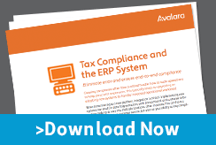ERP systems streamline many critical functions for any business. Yet too often, companies rely on spreadsheets to manage common activities—a risky prospect that’s labor-intensive and error-prone. A better option is to bring these activities into your financial management or ERP system. Centralizing tasks such as order filling, inventory management and delivery tracking can positively efficiency and cost-savings.
Here are five ways that ERP software benefits your bottom line.
1. Right-Sized Inventory
Getting inventory right can be tricky: too low, you risk losing customers; too high and you’re left holding the bag so to speak. Monitoring and managing inventory in your ERP helps minimize holding costs while still meeting customer demands. Centralized vendor data makes it easy to find a back-up supplier, compare costs and negotiate pricing.
2. Control Quality
Dealing with defective materials or products can be a drain on your business. Not only can it hurt sales, but it can also damage your reputation. Supply chain management software can help you evaluation and document the quality of your suppliers and supply chain partners including approved supplier lists (ASL) and product anomalies.
3. Optimize Shipping
Web sales have made fast, affordable shipping a must-do for all businesses. Keeping track of goods coming and going can become burdensome, not to mention the hassle of dealing with lost or late shipments. The right ERP integration can help determine optimal shipping options—both from a customer service and cost perspective.
4. Improve Cash Flow
Invoicing practices can greatly impact your cash flow. Moving from a manual process to automation allows you to process invoices faster and shorten the order-to-cash cycle. In fact, data shows that, with automation, most companies can reduce day sales outstanding (DSO) by 3 to 8 days, freeing up substantial working capital.
5. Be Tax Compliant
Navigating complex and ever-changing trade and tax rules can be daunting. Being part of a supply chain compounds that risk. ERP systems are excellent tools for assessing risk in your business such as rules and regulations around buying or supplying to foreign vendors. Sales tax automation ensures proper invoicing, collection and remittance of sales and use tax and makes it easier to validate and account for resale or tax-exempt products and services.
A lot of businesses don’t have plans in place to mitigate these risks. Don’t let a break in your processes spell disaster for your business.
Ditch the Spreadsheets
 Ditch the spreadsheets in favor of robust tools that strengthen both your supplier and customer relationships.
Ditch the spreadsheets in favor of robust tools that strengthen both your supplier and customer relationships.
Learn more by reading our free guide “Tax Compliance in Your ERP System.”



